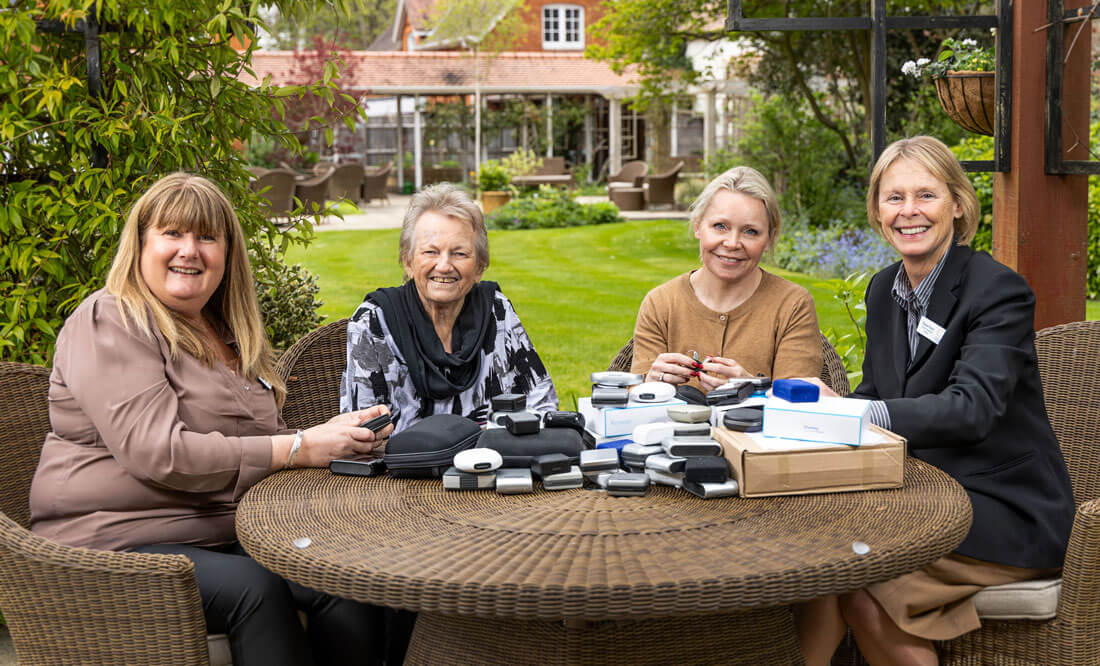
In the garden at Canford Chase in Poole with some of the hearing aids collected at Colten Care homes are, from left: Home Manager Charlotte Wilson; resident Anne Hammond; Zoe Fawcett-Eustace, founder of Hearing Aid Recycling; and Elaine Farrer, Colten Care's Chief Operating Officer.
The founder of a hearing aid recycling campaign has visited a Dorset, UK, care home to thank residents and staff for supporting her work. Zoe Fawcett-Eustace called in at Canford Chase in Poole to collect more than 230 no-longer-needed hearing aids which will now be repurposed to help some of the world's poorest people.
The devices were gathered at the Western Road home and Colten Care’s 20 other care homes in Dorset, Hampshire, Wiltshire and West Sussex. It followed an agreement last year between the provider and Zoe’s organisation, Hearing Aid Recycling, under which the homes act as collection points for used or unwanted hearing aids to avoid them having to go to landfill.
Colten Care became the first UK care home provider to partner with the charity, encouraging residents, families and people in the community around each home to donate their old devices.
 Speaking at Canford Chase, Fawcett-Eustace said: “We’re so grateful for Colten Care’s help. The donated hearing aids will make such a difference to people in need here and around the world. They will genuinely help to transform lives from the very young to the very old. We already have activities happening in countries such as Malawi, Kenya, Zimbabwe and South Africa. We couldn’t do this without the incredible support of everyone who donates and our amazing collection centres who receive, hold and send us the aids. It’s such a privilege to work on a project that does so much good.”
Speaking at Canford Chase, Fawcett-Eustace said: “We’re so grateful for Colten Care’s help. The donated hearing aids will make such a difference to people in need here and around the world. They will genuinely help to transform lives from the very young to the very old. We already have activities happening in countries such as Malawi, Kenya, Zimbabwe and South Africa. We couldn’t do this without the incredible support of everyone who donates and our amazing collection centres who receive, hold and send us the aids. It’s such a privilege to work on a project that does so much good.”
Right: In rural Malawi, Precious Banda, 14, second from left, has received a recycled hearing aid from the charity, meaning he can return to school. Second from right is charity partner and audiologist Fletcher Chisalipo.
Fawcett-Eustace, who began to lose her hearing aged just 14, added: “I had the good fortune to be born in the UK so I was given hearing aids as soon as I needed them. The NHS looked after me for years. I eventually invested in private hearing aids, upgrading them to stream seamlessly to my phone.
“At that point I asked my audiologist what I should do with my extensive collection of old ones, both NHS and private. I was completely dismayed to be told to ‘pop them in a drawer, keep them for spares, ultimately throw them away’. Given our small planet of scarce resources and much need, I couldn’t bear the thought that such amazing tiny pieces of technology would just go to landfill.
“We have the knowhow to extend their productive lives and help tens of millions of deaf people around the world who would otherwise have no access to hearing aids. That’s why I set up Hearing Aid Recycling.”
In Malawi, charity partner and audiologist Fletcher Chisalipo has already received a batch of repurposed hearing aids from the charity. He cited the case of Precious Banda, a 14-year-old boy who suffered from severe malaria when he was seven.
“He lost his hearing as a result of quinine treatment for the disease,” Fletcher explained. “He dropped out of school because he couldn't hear in class, and his friends were mocking him.
“In his area of rural Malawi, we were told it might take three to four years for a government procurement process to source hearing aids. Now, we have fitted him with two aids for free and he can hear better. Both he and his mother are overjoyed and they have promised he will return to school.”
Click to find your nearest Colten Care home
Click for more information on Hearing Aid Recycling



